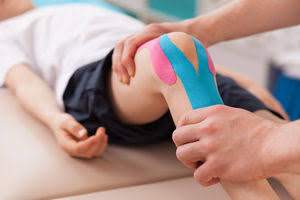Physiotherapy Technique
Hands-on Physiotherapy Techniques
Your physiotherapist may be trained in hands-on physiotherapy techniques such as:
- Joint mobilisation (gentle gliding) techniques,
- Joint manipulation,
- Physiotherapy Instrument Mobilisation (PIM).
- Minimal Energy Techniques (METs),
- Muscle stretching,
- Neurodynamics,
- Massage and soft tissue techniques
In fact, your physiotherapist has training that includes techniques used by most hands-on professions such as chiropractors, osteopaths, massage therapists, and kinesiologists.
Physiotherapy Taping
Your physiotherapist is a highly skilled professional who utilises strapping and taping techniques to prevent injuries.
Some physiotherapists are also skilled in the use of kinesiology taping.
Acupuncture and Dry Needling
Many physiotherapists have acquired additional training in the field of acupuncture and dry needling to assist pain relief and muscle function.
Physiotherapy Exercises
Physiotherapists have been trained in the use of exercise therapy to strengthen your muscles and improve your function. Physiotherapy exercises have been scientifically proven to be one of the most effective ways that you can solve or prevent pain and injury.
Your physiotherapist is an expert in the prescription of the "best exercises" for you and the most appropriate "exercise dose" for you depending on your rehabilitation status. Your physiotherapist will incorporate essential components of pilates, yoga and exercise physiology to provide you with the best result.
They may even use Real-Time Ultrasound Physiotherapy so that you can watch your muscles contract on a screen as you correctly retrain them.
Biomechanical Analysis
Biomechanical assessment, observation and diagnostic skills are paramount to the best treatment.
Your physiotherapist is a highly skilled health professional with superb diagnostic skills to detect and ultimately avoid musculoskeletal and sports injuries. Poor technique or posture is one of the most common sources of repeat injury.
Sports Physiotherapy
Sports physio requires an extra level of knowledge and physiotherapy skill to assist injury recovery, prevent injury and improve performance. For the best advice, consult a Sports Physiotherapist.
Workplace Physiotherapy
Not only can your physiotherapist assist you at sport, they can also assist you at work. Ergonomics looks at the best postures and workstation set up for your body at work. Whether it be lifting technique improvement, education programs or workstation setups, your physiotherapist can help you.
Plus Much More..
Your physiotherapist is a highly skilled body mechanic. Every physiotherapist has expertise in certain injuries or condition. For advice regarding your specific problem, please contact your physiotherapist.



Comments
Post a Comment